Place-based learning, mountains, hiking, turberas and more! Past Review
By Olivia N (Environmental Studies, Davidson College) - abroad from 08/26/2019 to 12/09/2019 with
SIT Study Abroad: Argentina: People, Environment, and Climate Change in Patagonia and Antarctica
I found another place to call home, I became more independent, my Spanish improved a lot, made friends from places all over the US, and spent a lot of time outdoors! It was 100% worth it.
Review Photos
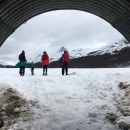
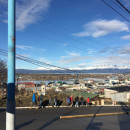
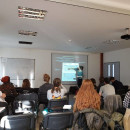
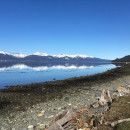
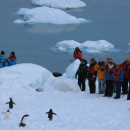
Personal Information
| How much international exposure did you have prior to this program? | 2 weeks - 1 month |
Review Your Program
|
* Overall educational experience
Academic rigor, intensity, resources, etc. |
I really enjoyed the program's "place-based" learning, where we learned about the local ecology, human-environment relationships through industries such as fisheries and tourism, and environmental movements. All of the classes were in Spanish (which personally didn't pose a challenge but did for some) and while they themselves were not extremely vigorous, the schedule was tight with long classes with little time to do homework and projects outside of class. However, it was still less rigorous than my home institution and didn't take away a lot from my experience abroad. |
|
* Host Country Program Administration
On-site administration of your program |
The director and coordinators of the program are great! They want your feedback and are willing to listen and work with you on any issues you are having with academics, homestays or personal challenges, and are usually pretty accessible to contact. |
|
* Housing:
How satisfied were you with your living arrangements? |
I loved my host family! In my letter to my host family I was very clear cut about my dietary restrictions and that I really like cooking and biking and my host mom let me borrow her bike while I was there and have unrestricted use of the kitchen. She was so sweet and helpful and I still keep in touch with her! My host brother was always very kind, funny and made me feel very welcome. |
| * Food: |
I am vegetarian, as were the majority of the people on my program, and I found it relatively easy to maintain my diet abroad (however my host family allowed me to have full reign of the kitchen and this was not common among my classmates) Argentina, and Ushuaia have very meat-heavy diets and seafood is not common. It would be really difficult to be vegan since lard and cheese are used in a lot of foods. The most commons foods are various types of empanadas, pastries, and meat dishes (chicken is not nearly as common as in the US). Since everything needs to be shipped to Tierra del Fuego, as it is an island, the main fruits are apples, bananas and oranges and there is a pretty good selection of vegetables. The food is generally pretty bland, heavy and lacking spice (this makes it sound bad but it was manageable for a foodie). Your host family prepares most of your meals (breakfast and dinner) and my host mom would often ask me what I wanted to eat, and let me cook if she wasn't home, but other students usually ate whatever their family ate at meals with some say in food. |
|
* Social & Cultural Integration:
How integrated did you feel with the local culture? |
I felt most integrated with the local culture when volunteering with local environmental organizations and when spending time with my host family- it takes more effort since all of your classes are with US students, not locals. The director and coordinators share events and ways to get involved while you're there. |
|
* Health Care:
How well were health issues addressed during the program? |
The director of the program helped me set up regular vaccines I had to have in a clinic (personal health not necessary for the program), and my host mom went with me to help me navigate the healthcare system. It was definitely easily accessible with some assistance from locals. I had the typhoid oral vaccine before and was up to date on all other vaccines. |
| * Safety: |
I felt very safe walking around as a female student by myself during the day and in the evening. I didn't walk anywhere by myself often at night, usually with a friend just to be safe although I would've been fine by myself (and keep in mind that the southern latitude affects the daylight hours significantly, I often walked around between 9 and 10 at night and it was still very light outside in their spring to summer seasons). Only one person was pickpocketed and we all felt safe walking around town and it was not a normal occurrence, it was not necessary to wear a money belt every day. Most of the stray dogs are pretty friendly in Ushuaia (in some excursion locations they were very territorial) but it's good to give them space unless they start following you to be pet. |
| If you could do it all over again would you choose the same program? |
Yes
The location was beautiful, the material was interesting and relevant to understanding the culture, society, ecology and economy of Ushuaia, the outdoors were so accessible, and the people are kind, helpful and amazing! |
Finances
|
* Money: How easily were you able to live on a student's budget?
(1 = not very easy/$200+ on food & personal expenses/week, 2.5 = $100/week, 5 = very easily/minimal cost) |
I found it very easy to live on a budget with the given stipend. I spent most of my money on food staples to cook with to pack lunch, snacks, cafes and some small souvenirs and gifts at the end. Taxis and remises are pretty cheap compared to in the US, but I mostly walked to get to class and host families are often willing to give you a ride somewhere within reason. I probably spent $25-30 on food/week packing my lunches most of the time. |
| Not including program expenses, about how much money did you spend on food and other expenses each week? | I probably spent $25-30 on food/week (packing my lunches most of the time) |
| Do you have any general money-saving tips for future study abroad participants? | Pack your lunch and watch the exchange rates, they fluctuate frequently! |
Language
| * Did your program have a foreign language component? | Yes |
|
How much did the program encourage you to use the language?
0 = No encouragement, 5 = frequent encouragement to use the language |
|
| How would you rate your language skills at the beginning of the program? | Advanced |
| How would you rate your language skills at the end of the program? | Fluent |
| How many hours per day did you use the language? |
Other Program Information
|
* Where did you live?
Select all that apply |
|
|
* Who did you live with?
Select all that apply |
|
|
* Who did you take classes with?
Select all that apply |
|
| About how many local friends did you make that you will likely keep in touch with? |
A Look Back
| * What did you like most about the program? |
|
| * What could be improved? |
|
| * What do you know now that you wish you knew before going on this program? | Pack lightly, multiple layers and a GOOD pair of hiking boots and walking shoes! Even if it's at the southernmost tip of South America it's not always freezing, pack a few t-shirts and a pair of shorts. You will also spend a fair amount of time in buses or boats traveling so pack motion sickness medication if necessary (especially patches for Antarctica!). This program is also has mostly "research" opportunities for the ISP and only a few internships, as they are seasonal. |








